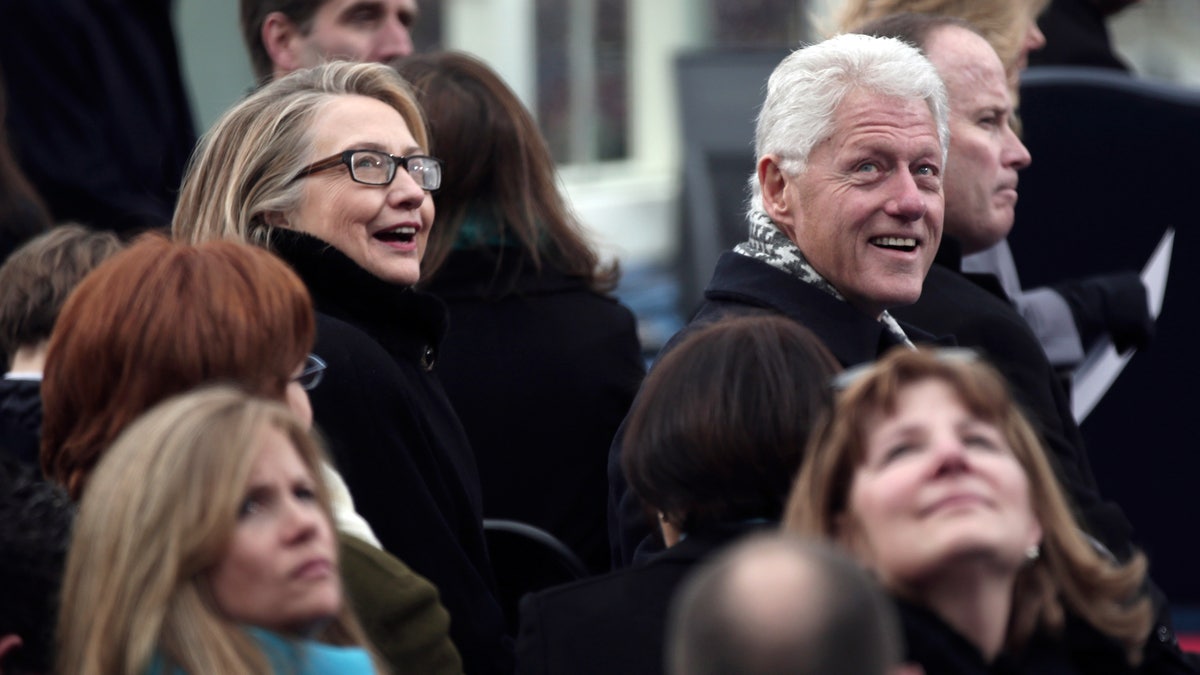
Secretary of State Hillary Rodham Clinton and former president Bill Clinton look on during the ceremonial swearing-in ceremony during the 57th President Inauguration, Monday, Jan. 21, 2013, on the West Front of the Capitol in Washington. (AP Photo/Win McNamee, Pool) (The Associated Press)
WASHINGTON – Secretary of State Hillary Rodham Clinton insisted on Wednesday that the department is moving swiftly and aggressively to strengthen security at U.S. installations missions worldwide after the deadly Sept. 11 raid on the consulate in Libya.
In probably her last appearance on Capitol Hill as America's top diplomat, Clinton once again took full responsibility for the department's missteps leading up to assault at the U.S. Consulate in Benghazi, Libya that killed Ambassador Chris Stevens and three other Americans.
Her voice cracking at times, Clinton said the work was highly personal.
"I stood next to President Obama as the Marines carried those flag-draped caskets off the plane at Andrews. I put my arms around the mothers and fathers, sisters and brothers, sons and daughters," she said.
Clinton said the department is implementing the 29 recommendations of an independent review board that harshly criticized the department as well as going above and beyond the proposals, with a special focus on high-threat posts.
"Nobody is more committed to getting this right," she told the Senate Foreign Relations Committee. "I am determined to leave the State Department and our country safer, stronger, and more secure."
Her testimony focused not only on the attack but the growing threat from extremists in northern Africa, pointing out that Libya was not an isolated incident.
"The Arab revolutions have scrambled power dynamics and shattered security forces across the region," she said. "And instability in Mali has created an expanding safe haven for terrorists who look to extend their influence and plot further attacks of the kind we saw just last week in Algeria."
She said the Obama administration is pressing for a greater understanding of the hostage-taking and rescue effort that left three Americans dead.
In something of a valedictory, Clinton noted her robust itinerary in four years and her work, nearly 1 million miles and 112 countries.
"My faith in our country and our future is stronger than ever. Every time that blue and white airplane carrying the words "United States of America" touches down in some far-off capital, I feel again the honor it is to represent the world's indispensable nation. And I am confident that, with your help, we will continue to keep the United States safe, strong, and exceptional."
Clinton is the sole witness at back-to-back hearings before the Senate and House foreign policy panels on the September raid.
Clinton had been scheduled to testify before Congress last month, but an illness, a concussion and a blood clot near her brain forced her to postpone her appearance.
Absent from the hearing was Sen. John Kerry, D-Mass., the man tapped to succeed Clinton. His swift Senate confirmation is widely expected. Kerry's confirmation hearing is scheduled for Thursday.
Clinton's testimony will focus on the attack after more than three months of Republican charges that the Obama administration ignored signs of a deteriorating security situation in Libya and cast an act of terrorism as mere protests over an anti-Muslim video in the heat of a presidential election. Washington officials suspect that militants linked to al-Qaida carried out the attack.
"It's been a cover-up from the beginning," Sen. John McCain, R-Ariz., the newest member of the Senate Foreign Relations Committee, said Tuesday.
Politics play an outsized role in any appearance by Clinton, who sought the Democratic presidential nomination in 2008 and is the subject of constant speculation about a possible bid in 2016. The former first lady and New York senator — a polarizing figure dogged by controversy — is about to end her four-year tenure at the State Department with high favorable ratings.
A poll early last month by the Pew Research Center for the People & the Press found 65 percent of Americans held a favorable impression of Clinton, compared with 29 percent unfavorable.
Challenging Clinton at the hearing will be two possible 2016 Republican presidential candidates — Florida's Marco Rubio and Kentucky's Rand Paul, also a new member of the committee.
Clinton did little to quiet the presidential chatter earlier this month when she returned to work at the State Department after her illness. On the subject of retirement, she said, "I don't know if that is a word I would use, but certainly stepping off the very fast track for a little while."
With respect to Benghazi, the State Department review singled out the Bureau of Diplomatic Security and the Bureau of Near East Affairs, saying there appeared to be a lack of cooperation and confusion over protection at the mission in Benghazi. The report described a security vacuum in Libya after rebel forces toppled the decades-long regime of strongman Moammar Gadhafi.
The report made 29 recommendations to improve diplomatic security, particularly at high-threat posts.
Spokeswoman Victoria Nuland said Clinton "pledged not only to accept all 29 of the recommendations, but to have the implementation of those recommendations well under way before her successor took over. So I think she'll want to give a status on that."
Asked for the number of State Department employees fired for their handling of Benghazi, Nuland said four people were put on administrative leave. They included Eric Boswell, who resigned from the position of assistant secretary of diplomatic security.
But Nuland declined to say if Boswell and the others still are working for the department in some capacity.
___
Associated Press writers Bradley Klapper and Andrew Miga contributed to this report.

